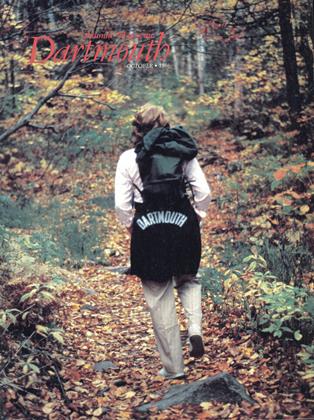At the request of President McLaughlin, Prof. Wayne Broehl Jr. has begun exploring educational projects relating to African problems. Broehl, the Kimball Professor of the Science of Administration at the Tuck School and an adjunct professor of geography, was chosen for the task partly because he once chaired the panel that eventually evolved into the Advisory Committee on Investor Responsibility, and more recently his research for a corporate history of John Deere led to South Africa where that company maintains operations. Broehl believes Africa as a whole will experience development problems in the coming decades. He sees his task as finding roles that will help Dartmouth make new, positive responses to these problems.
According to Broehl, "the campus as a whole needs its consciousness heightened." One of his plans, a repository for African information, is already taking shape. Despite the fact that issues such as divestment are on the minds of faculty, students, Trustees, and alumni, relatively few people on campus have access to timely information about Africa and related issues. After getting positive responses when he mentioned the idea informally, Broehl, with the help of James Breeden, dean of the Tucker Foundation, Nelson Kasfir, professor of government, Leo Spitzer, professor of history, and several library officials transformed the concept into a reality.
The repository won't be an actual place in Baker Library, however. It will consist of a computer database listing economic, political, geographical, and social scientific works relating to Africa. The respository will also contain works in the humanities, including fiction. Broehl emphasized the need for fiction because fictional works are often a means people can use to protest or comment on the system.
According to Phyllis Jaynes, director of user services at the library, the catalog for the respository will differ from the on-line catalog already in use. In addition to bibliographic data with annotations, the catalog for the repository will contain references to materials not readily retrievable from the regular catalog such as listings and abstracts of articles published in periodicals and references to government publications. Broehl expects the repository will also include information relating to Dartmouth's investor position such as letters the College has sent to companies doing business in South Africa and their replies.
Since the catalog resides on a mainframe computer that is accessible via the campus network, students, faculty, and staff will be free to "browse" from offices, homes, or dorms to see what new materials have been added. Because the situation in Africa is changing so rapidly, Broehl wants the repository to keep the Dartmouth community on the cutting edge in terms of information access. There will also be an on-line bulletin board highlighting new materials and announcing topical programs.
A second project Broehl's group is exploring is bringing South African scholars to the College's professional schools. Broehl envisions South African doctors, trade union leaders, business managers, and educators studying at Dartmouth as a kind of mid-career training. He believes when there is a change in South Africa's government, they will be the potential leaders. This program is still in the preliminary planning stage. Dartmouth and other members of the Carnegie Endowment will work with the Educational Opportunities Council, a South African organization presided over by Bishop Desmond Tutu.
 View Full Issue
View Full Issue
More From This Issue
-
 Feature
FeatureBONFIRE!
October 1986 By Shelby Grantham -
 Feature
FeaturePapa's Son
October 1986 By Everett Wood '38 -
 Feature
FeatureA China Perspective
October 1986 By President David T. McLaughlin '54 -
 Article
ArticleDartmouth Authors
October 1986 By C. E. Widmayer -
 Article
ArticleCarl Thum: Teacher of how to learn
October 1986 By Georgia Croft -
 Sports
SportsThe Key to Defense
October 1986 By Jim Neeciham '70
Article
-
 Article
ArticleText of President Hopkins' Dedication Address
March 1936 -
 Article
ArticleBRIEF BIOGRAPHY FRANCIS M. SHEA
March 1940 -
 Article
ArticleMentors & Friends
APRIL 1998 -
 Article
ArticleCollege Makes Cuts
May/June 2009 -
 Article
ArticleTuck School
December 1944 By G. W. Woodworth, H. L. Duncombe Jr. -
 Article
ArticleRonnie Clemmer '71: Finding Color and Comedy in Chaos
OCTOBER • 1986 By Kathy Hoes '83

